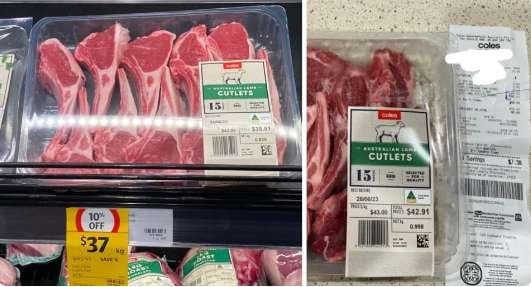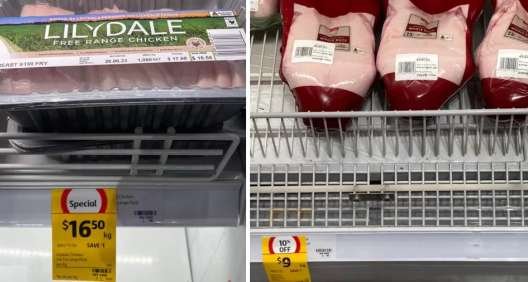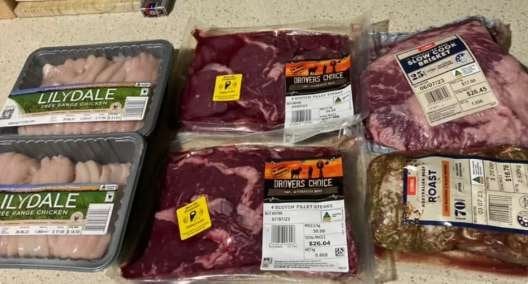This Coles meat tip has shoppers divided—'Cheap and dodgy' or ‘pure genius’?
Here at the Seniors Discount Club, we're all about finding ways to save money and stretch our budget. However, a recent revelation about a shopper's strategy for scoring free food at supermarket checkouts has divided opinions online—with some labelling it as 'cheap and dodgy' while others called it ‘pure genius’.
Aussies recently discovered they could obtain free groceries from Coles, Woolworths, and ALDI by leveraging the Scanning Code of Practice.

Under the voluntary code adopted by many retailers, including ALDI, customers are entitled to receive a particular item for free if it scans at a higher price than displayed.
While this code is not a legal requirement, it serves as a customer satisfaction measure to ensure transparency and fairness in pricing.
ALDI, for example, explicitly states on their website that if a regular product scans at a price higher than the displayed amount, customers are entitled to receive the first item for free, while subsequent items will be charged at a lower price.
One Coles customer took to social media to share their savvy scheme, admitting they haven't paid for meat in over a month by seeking out incorrectly marked items to exploit this policy.
While some critics raised ethical concerns about this approach, others have shown support, applauding the customer for taking advantage of store policy and money-saving tips.
According to an anonymous member of a Facebook group for bargain hunters, shoppers should keep an eye out for special yellow stickers that don't match the product's price tag.
The member recounted a recent experience finding four different products mismarked at a supermarket shop. One notable example was lamb cutlets, meant to be on special for $37/kg but mistakenly marked at $43/kg.

The customer took photos of improperly priced meat at Coles and shared them to inform and assist other shoppers in recognising the pricing error. Source: Facebook
The shopper made the most of this discrepancy by purchasing a tray of cutlets priced at $42.91, and then requesting a price check at the service desk.
As per the store's policy, since the item was scanned at a higher price than indicated by a yellow 'special' tag on the shelf, the customer was entitled to a full refund.
They went on to reveal that this method resulted in a month of not paying for meat. 'Free meat ALWAYS tastes better.' the customer said, encouraging others to consider the approach, especially if their local Coles store struggles with updating the prices of items on special.
'$138 worth of free meat from three Coles tonight—that's us eating free meat for the week!' the customer added, after a successful evening of hunting price discrepancies at different stores.
However, not everyone approves of this money-saving venture, with one critic commenting, 'To hunt this down and take advantage is just cheap and dodgy.'
The anonymous member defended their actions, citing the cost of living crisis as a reason why some individuals might resort to such measures.
The customer wrote, 'Some people these days are choosing between paying rent, heating or eating, so if they can get a decent meal for free doing this, then I wouldn't call it dodgy.'

Others labelled the strategy 'embarrassing', and one even accused the shopper of extortion.
Concerns were also raised about the potential impact on future pricing and the burden that this could place on other customers.
'How about you manage your finances better or get a second job rather than looking for easy hand-outs?' an angry user suggested.
In contrast, many supported the shopper's actions, arguing that the occasional free item won't significantly affect supermarket chains.
'Thank you so much for sharing. I'll definitely be checking now.' one supporter commented.
'I cannot wait to try this!' said another.
 As you can tell, the debate is ongoing. But it raises the question: is this a clever, money-saving tip or a manipulative and unethical practice? We'd love to hear what our members think. Weigh in with your opinions, and happy shopping!
As you can tell, the debate is ongoing. But it raises the question: is this a clever, money-saving tip or a manipulative and unethical practice? We'd love to hear what our members think. Weigh in with your opinions, and happy shopping!
Aussies recently discovered they could obtain free groceries from Coles, Woolworths, and ALDI by leveraging the Scanning Code of Practice.

The customer posted pictures of mispriced meat at Coles, intending to alert fellow shoppers about the discrepancy to help them identify it. Source: Facebook
Under the voluntary code adopted by many retailers, including ALDI, customers are entitled to receive a particular item for free if it scans at a higher price than displayed.
While this code is not a legal requirement, it serves as a customer satisfaction measure to ensure transparency and fairness in pricing.
ALDI, for example, explicitly states on their website that if a regular product scans at a price higher than the displayed amount, customers are entitled to receive the first item for free, while subsequent items will be charged at a lower price.
One Coles customer took to social media to share their savvy scheme, admitting they haven't paid for meat in over a month by seeking out incorrectly marked items to exploit this policy.
While some critics raised ethical concerns about this approach, others have shown support, applauding the customer for taking advantage of store policy and money-saving tips.
According to an anonymous member of a Facebook group for bargain hunters, shoppers should keep an eye out for special yellow stickers that don't match the product's price tag.
The member recounted a recent experience finding four different products mismarked at a supermarket shop. One notable example was lamb cutlets, meant to be on special for $37/kg but mistakenly marked at $43/kg.

The customer took photos of improperly priced meat at Coles and shared them to inform and assist other shoppers in recognising the pricing error. Source: Facebook
The shopper made the most of this discrepancy by purchasing a tray of cutlets priced at $42.91, and then requesting a price check at the service desk.
As per the store's policy, since the item was scanned at a higher price than indicated by a yellow 'special' tag on the shelf, the customer was entitled to a full refund.
They went on to reveal that this method resulted in a month of not paying for meat. 'Free meat ALWAYS tastes better.' the customer said, encouraging others to consider the approach, especially if their local Coles store struggles with updating the prices of items on special.
'$138 worth of free meat from three Coles tonight—that's us eating free meat for the week!' the customer added, after a successful evening of hunting price discrepancies at different stores.
However, not everyone approves of this money-saving venture, with one critic commenting, 'To hunt this down and take advantage is just cheap and dodgy.'
The anonymous member defended their actions, citing the cost of living crisis as a reason why some individuals might resort to such measures.
The customer wrote, 'Some people these days are choosing between paying rent, heating or eating, so if they can get a decent meal for free doing this, then I wouldn't call it dodgy.'

The shopper documented their successful hunt for price discrepancies at three different Coles stores in one night and shared a subsequent $138 haul that ended up being completely free. Source: Facebook
Others labelled the strategy 'embarrassing', and one even accused the shopper of extortion.
Concerns were also raised about the potential impact on future pricing and the burden that this could place on other customers.
'How about you manage your finances better or get a second job rather than looking for easy hand-outs?' an angry user suggested.
In contrast, many supported the shopper's actions, arguing that the occasional free item won't significantly affect supermarket chains.
'Thank you so much for sharing. I'll definitely be checking now.' one supporter commented.
'I cannot wait to try this!' said another.
Key Takeaways
- A shopper's strategy for scoring free food at supermarkets such as Coles, Woolworths, and ALDI has ignited a fiery debate online.
- The shopper leverages the Scanning Code of Practice, which entitles customers to free items if they scan at a higher price than displayed.
- Critics raised ethical concerns about this approach, while others supported the money-saving tip.
- The anonymous shopper defended the act, emphasising Australia's cost of living crisis as a compelling reason for some individuals to resort to such measures.







